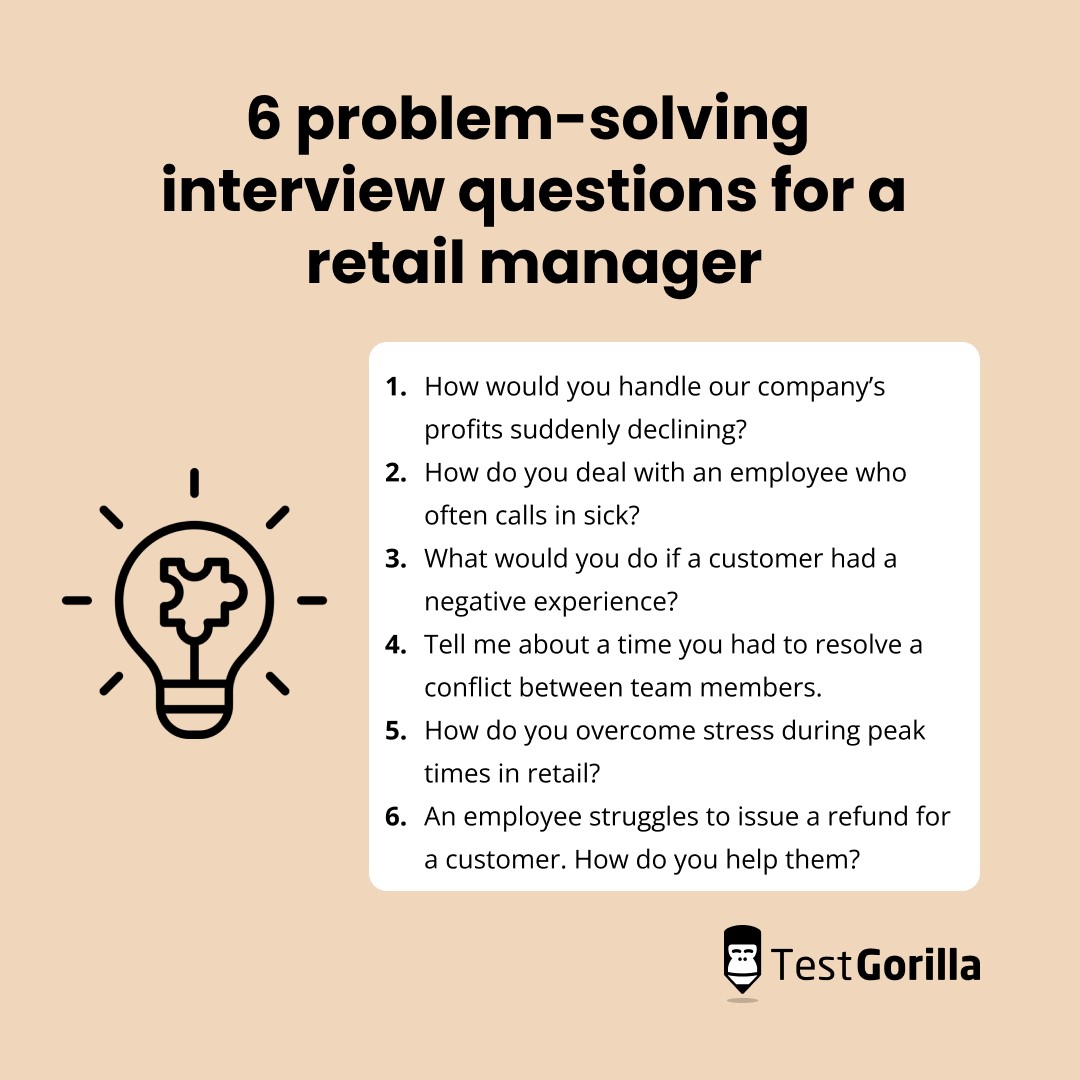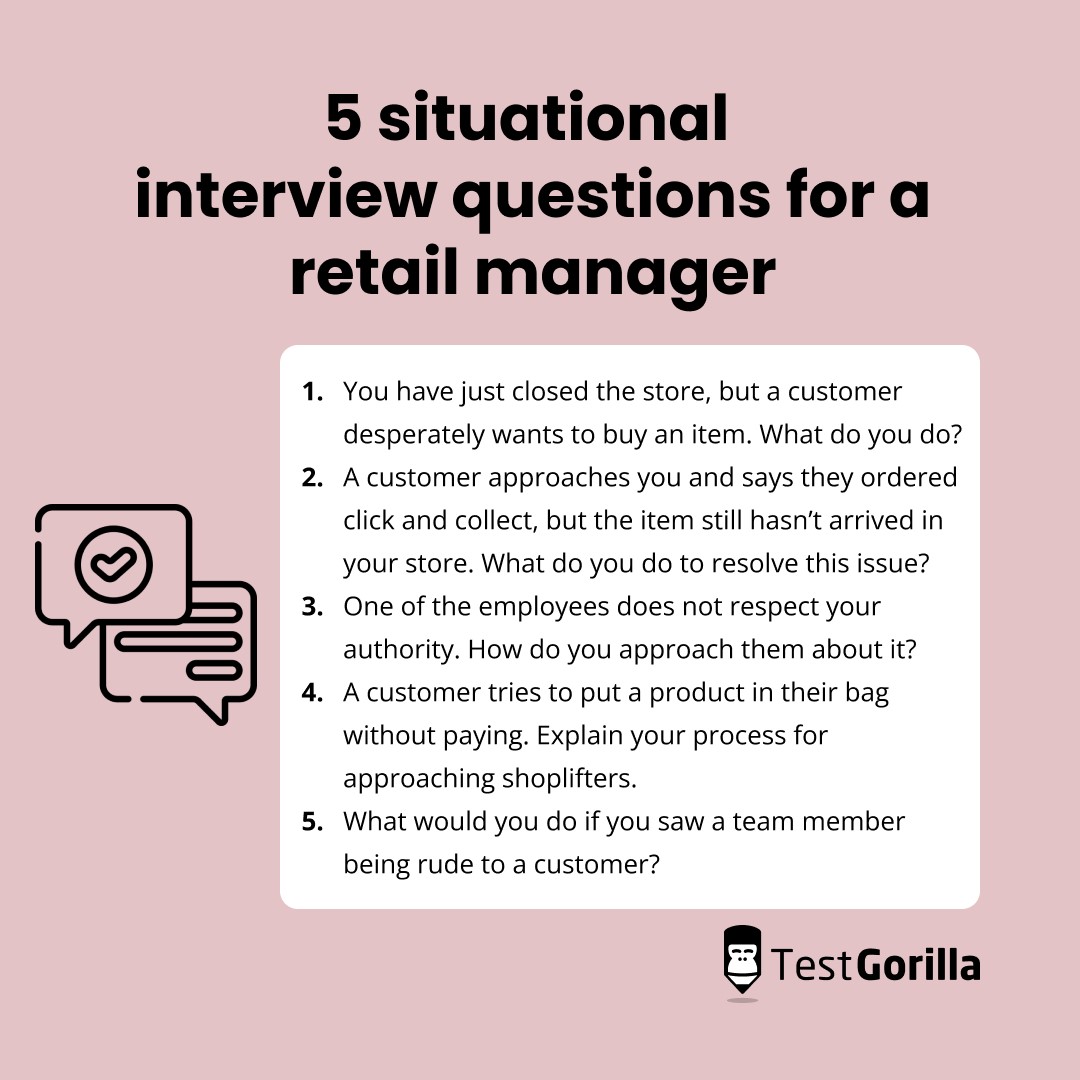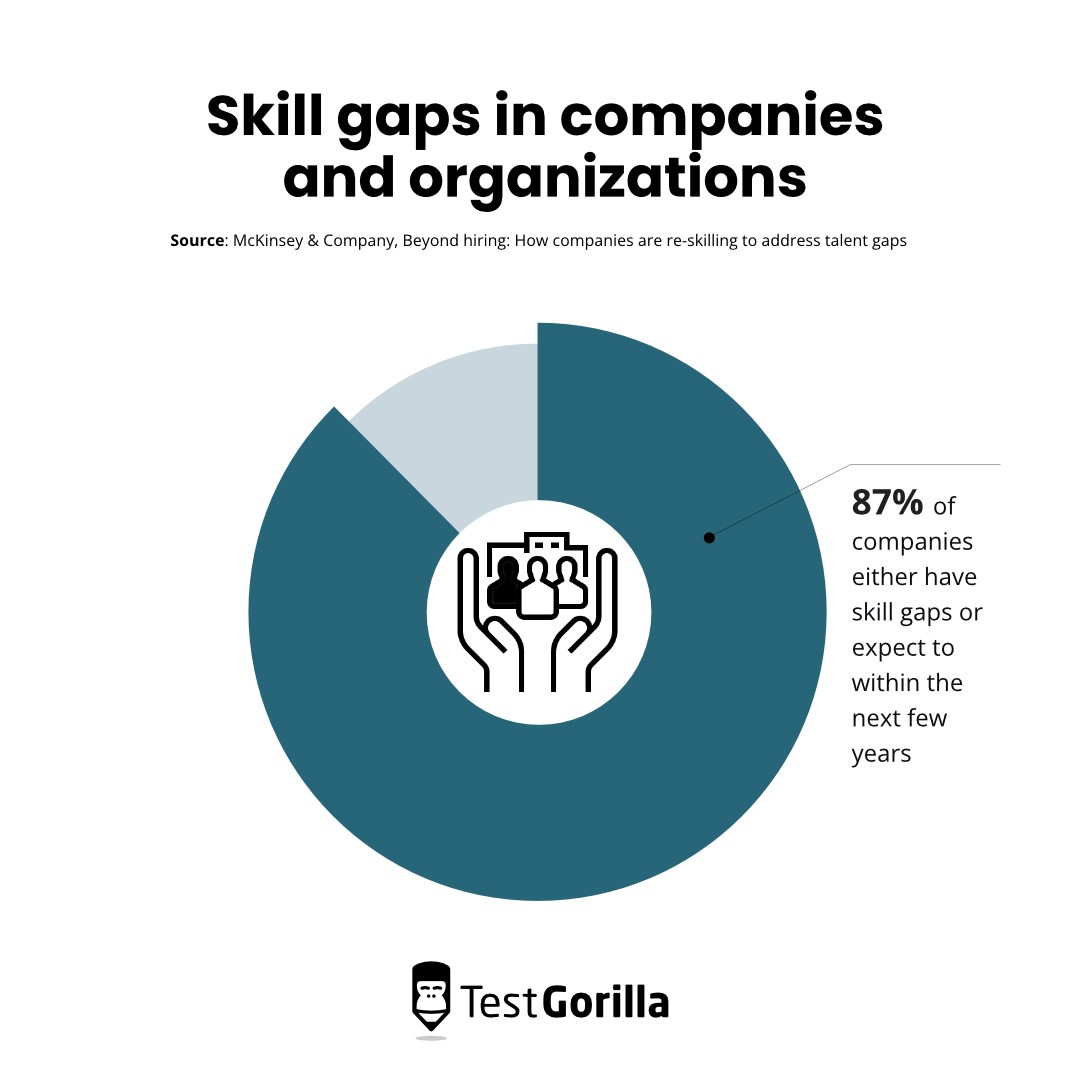55 retail manager interview questions to use for customer service roles
Roles in retail management can be demanding and challenging. Candidates who are passionate about providing the best customer service should have communication, problem-solving, and active listening skills. It’s important to hire candidates with the determination to enhance customer satisfaction.
One way to find top talent is by using a Customer Service test. This skills test determines which candidates can boost your company’s revenue and improve customer retention rates.
So, are you ready to find professionals in retail management? Discover 55 retail manager interview questions and sample answers to help you hire the right person for your business.
Table of contents
- 25 frequently asked retail manager interview questions to test candidates
- 8 sample answers to frequently asked retail manager interview questions
- 20 retail manager interview questions related to problem-solving skills
- 6 sample answers to problem-solving retail manager interview questions
- 10 situational retail manager interview questions to ask job applicants
- 5 sample answers to situational retail manager interview questions
- When you should use skills tests in your hiring process
- Hire top talent using our skills tests and retail manager interview questions
25 frequently asked retail manager interview questions to test candidates
Check out these 25 frequently asked retail manager interview questions to test candidates’ knowledge of your open position and the customer service industry as a whole.
1. Why do you want to work in a retail management role?
2. What do you know about our company?
3. Are you comfortable creating training sessions for new employees?
4. Describe a time you had to make a critical decision.
5. What techniques do you use to ensure your team members stay productive?
6. How do you delegate tasks?
7. What steps have you taken to establish good communication with your team?
8. Tell me about your customer service philosophy.
9. How do you stay organized as a retail manager?
10. What qualities do you think are essential in a retail manager?
11. Do you have any experience working in leadership roles?
12. How do you ensure customers feel comfortable shopping in the store?
13. Have you ever had to fire an employee? How did you go about it?
14. What qualifications do you look for in potential employees?
15. How do you usually monitor your team’s performance?
16. Do you have experience managing inventory?
17. How long do you intend to stay in retail as a career?
18. Tell me about a time you exceeded a customer’s expectations.
19. What is your favorite part about managing others?
20. How would you describe your work style?
21. What does teamwork mean to you?
22. What do you believe creates a positive team culture?
23. Do you take risks as a retail manager?
24. How would your team describe your management skills?
25. What have been your greatest achievements as a retail manager?
8 sample answers to frequently asked retail manager interview questions
Use these sample answers to some of the most frequently asked interview questions to determine which candidate could be a successful retail manager in your organization.
1. Tell me about your customer service philosophy.
A customer service philosophy is a set of crucial principles and practices that encourage team members to interact with customers the right way. Retail managers need to promote a shared objective for the team to ensure every customer receives the same positive experience.
Whether they’re beginners or experienced professionals, candidates should have their own beliefs and principles that help them provide consistent and effective customer support.
2. What techniques do you use to ensure your team members stay productive?
Retail managers should always be aware of how employees are performing in your business. The ideal candidate will talk you through the steps they take to monitor productivity levels and improve team members’ efficiency.
For example, they might prefer a feedback cycle that enables them and their team to discuss their top skills, achievements, and potential improvements.
Other techniques include the following:
Setting clear expectations at the start of each day
Using time management software
Measuring profits throughout the month
Focusing on results rather than hours
Providing more positive reinforcement
Creating short- and long-term goals
3. What steps have you taken to establish good communication with your team?
Communication is essential for building a productive team. Employees should know exactly what they need to achieve and how they can improve. Candidates with previous work experience in retail management can discuss how they enhanced their communication skills to strengthen the team.
For instance, one candidate may rely on productive feedback meetings to ensure all team members are on the same page.
Send candidates a Communication Skills test to determine whether they can communicate effectively with customers and team members. This test also gives them an opportunity to prove their active listening skills and ability to understand non-verbal cues.
4. What qualities do you think are essential in a retail manager?
This question focuses more on the candidate’s beliefs and expectations. Based on their response, you can learn more about their prominent personality traits, especially if you want to hire someone who fits your company’s culture.
Some of the vital qualities of a retail manager include the following:
Strong customer service skills
The ability to lead and guide others
Consistent motivation
Experience with project management software
Commercial awareness
Effective decision-making
Knowledge of sales and profits
Do you need to assess some of these abilities? Use a Retail Sales test to see whether candidates would improve customer satisfaction and maintain professional relationships after successful sales.
5. Have you ever had to fire an employee? How did you go about it?
A retail manager may sometimes need to terminate employees for various reasons. Hiring a candidate who can navigate this process professionally without breaking your organization’s regulations is essential.
Candidates should provide the steps they would take to fire an employee as smoothly as possible.
The best steps to navigate employee termination are to:
Document the main issues
Arrange a meeting with the employee
Cover essential contract termination points, such as pay and the final working day
Conduct an exit interview
Terminate the employee’s contract
6. How do you ensure customers feel comfortable shopping in the store?
Excellent customer service helps every person who walks into your store to feel comfortable. Retail managers should always ensure customers are happy since they drive sales and pass on their experience through word of mouth.
Candidates may have their own plans to improve customer satisfaction in the long term. For example, they could engage with in-store shoppers by sparking a conversation or discussing recent trends.
7. Do you have experience managing inventory?
Retail managers should understand inventory management and how it works. This process enables team members to track stock and give exact prices to customers. It also improves warehouse organization for businesses that sell an extensive range of products that require constant tracking.
Standard methods for managing inventory include to:
Write product information
Create a stock-receiving process
Invest in inventory management software
Set up regular stock alerts
Communicate the receiving procedures to team members
Assign each employee to a different section of the store
Are you searching for a data-driven way to test if candidates can handle these duties? Give them a Business Operations Management test to assess their inventory and supply chain management skills.
8. How do you usually monitor your team’s performance?
A team’s performance can tell retail managers whether they’re following the right customer service practices. Candidates with relevant work experience may already have performance monitoring methods, but beginners should still understand how to track your team’s strong and weak areas.
For example, the candidate may use monitoring software to see how each employee completes tasks and solves customers’ problems.
The best insights on HR and recruitment, delivered to your inbox.
Biweekly updates. No spam. Unsubscribe any time.
20 retail manager interview questions related to problem-solving skills
Here are 20 retail manager interview questions that can help you evaluate candidates’ problem-solving skills.
1. How would you handle our company’s profits suddenly declining?
2. Tell me about a time you had to resolve a conflict between team members.
3. What would you do if a customer had a negative experience?
4. Explain a mistake you made and how you handled it.
5. What would you do if there was an understaffed shift?
6. How do you deal with an employee who often calls in sick?
7. What would you do if an employee came to you about something personal?
8. The sales team failed to reach the monthly sales target. How would you deliver this feedback to your team?
9. How would you negotiate with a difficult person?
10. How would you approach a demanding stakeholder?
11. Tell me about a time you had to discipline a staff member for poor behavior and attitude.
12. Have you ever had a deadline you couldn’t meet? What happened?
13. How do you overcome stress during peak times in retail?
14. What would you do if higher management disagreed with your methods?
15. Have you ever tried to break your company’s rules to do things your way?
16. An employee struggles to issue a refund for a customer. How do you help them?
17. Tell us about a time you used leadership qualities.
18. What would you do if your business accidentally oversold products to customers?
19. Have you ever failed at something? What happened?
20. Tell me about a time you approached a task you’d never done before.
6 sample answers to problem-solving retail manager interview questions
Come back to these sample answers when reviewing candidates’ responses to problem-solving retail manager interview questions.
1. How would you handle our company’s profits suddenly declining?
There may be a time when your company’s profits suddenly plummet. Retail managers should have the determination and knowledge to combat declining sales. Ways to achieve this goal include focusing more on marketing strategies and reaching more customers through digital channels.
For instance, the ideal candidate will evaluate trends on social media to create compelling content for your store.
There’s an easy way to review your candidates’ potential actions in this scenario. Use a Problem Solving test to see how candidates respond to challenging situations using their analytical skills.
2. How do you deal with an employee who often calls in sick?
Sick days are inevitable for some employees, but if they become a regular occurrence for one team member, it may be a sign of another problem. Employees who constantly call in sick could be lying or dealing with a personal issue that the retail manager isn’t aware of.
Because of this problem, your business could be hindered by understaffed shifts and low productivity levels.
An ideal candidate will record the employee’s absences and arrange a private meeting to discuss the issue. If the employee doesn’t turn up or co-operate properly, it might be time to consider terminating their contract.
3. What would you do if a customer had a negative experience?
Retail managers should respond immediately to unhappy customers. A negative customer experience could affect your organization in many ways, including revenue loss, low retention rates, and a poor brand reputation.
Therefore, a retail manager needs to apologize and take responsibility. They must also use their active listening skills when solving customer complaints.
4. Tell me about a time you had to resolve a conflict between team members.
Research suggests that more than 36% of employees and managers experience conflict often. This conflict may result from a lack of communication or conflicting ideas. In a retail environment, it’s easy for team members to clash and disagree on how to approach tasks and improve customer service. Therefore, retail managers may need to step in at times.
The candidate may provide a previous example of conflicts they resolved or discuss ways they would ease the tension between team members. For instance, they could arrange a meeting with both parties to ensure everyone has the chance to talk and listen. As a result, team members must agree on a final outcome to prevent further conflict.
5. How do you overcome stress during peak times in retail?
Stress can make work much more challenging for retail managers, especially during peak months like November and December. These professionals must follow stress management practices to overcome job burnout.
One candidate may plan ahead of these peak times to stay organized. Other candidates could seek external support to ensure they feel motivated and healthy so that they can complete demanding tasks.
6. An employee struggles to issue a refund for a customer. How do you help them?
Employees may struggle to complete specific tasks. This challenge is especially true for new starters, so retail managers must have the patience, knowledge, and empathy to teach workers.
In their answer, the candidate should talk you through their steps. They might prefer to stand next to the employee and show them how to issue refunds. Or they may quickly sort the refunds themselves and arrange employee training on another day to ensure they don’t keep customers waiting.
One easy way to evaluate candidates’ ability in this area is to send them a Critical Thinking test to see how they use logic to solve complex problems independently.
10 situational retail manager interview questions to ask job applicants
Below is a list of 10 situational retail manager interview questions. You should choose questions that will help you learn more about candidates’ analytical thinking and approach to challenging situations.
1. What do you do if a customer wishes to pay for a large order entirely with change?
2. You have just closed the store, but a customer desperately wants to buy an item. What do you do?
3. What would you do if you saw a team member being rude to a customer?
4. One of the employees does not respect your authority. How do you approach them about it?
5. How successful have you been in delegating tasks? Explain your methods.
6. A customer approaches you and says they ordered click and collect, but the item still hasn’t arrived in your store. What do you do to resolve this issue?
7. You notice your stock is running low for a specific product, but none of the team members have documented it. How would you overcome this obstacle?
8. A customer tries to put a product in their bag without paying. Explain your process for approaching shoplifters.
9. One employee doesn’t turn up for work one day, and they haven’t called in sick. What are your next steps?
10. How would you encourage team members to engage more with customers in your store?
5 sample answers to situational retail manager interview questions
Refer to these sample answers to situational interview questions to identify a retail manager who can effectively complete the role’s duties.
1. You have just closed the store, but a customer desperately wants to buy an item. What do you do?
Customers may need help desperately when they’re in a rush. This could mean grabbing a product at the last minute when your store is about to close. An ideal candidate will clearly describe their approach to handling these urgent sales.
For example, they might sincerely apologize to the customer if they can’t sell anything after cash register closures. However, if these machines are still operational, they could quickly verify the transaction to ensure a positive customer experience.
2. A customer approaches you and says they ordered click and collect, but the item still hasn’t arrived in your store. What do you do to resolve this issue?
With click and collect, customers can order a product directly to your store. An email confirmation then tells them the expected pick-up date. However, there may be occasions when the product doesn’t reach your store in time.
A successful retail manager will sincerely apologize to the customer and explain why the product has been delayed. They can also notify the customer via text message when the product has arrived in the store. In some cases, retail managers will issue a refund as a further apology.
Use a Verbal Reasoning test to determine which candidates can use their language skills to apologize well and reach a positive conclusion for the customer.
3. One of the employees does not respect your authority. How do you approach them about it?
Retail managers should always approach employees who have a negative attitude. It’s important that team members behave appropriately when working in customer service since it affects the store’s reputation.
One way to do this is by arranging a private meeting with the disrespectful employee. In this meeting, the ideal candidate should question their behavior and discuss ways to collaborate effectively with others. If the employee doesn’t respect the warning, it may lead to the end of their contract.
A Leadership & People Management test will tell you more about a candidate’s leadership style and ability to guide others with professional authority.
4. A customer tries to put a product in their bag without paying. Explain your process for approaching shoplifters.
Shoplifting is a common crime in the retail industry, and 72.4% of retail loss prevention executives believe that the overall risk of shoplifting in their organizations has increased since the start of the pandemic.
Customers can sneak products into their bags and walk out of your store without paying a single cent. The consequences of these crimes can include reduced profits, low employee morale, and tighter security measures that could exceed your company’s budget.
As a retail manager, it’s important to approach shoplifters the right way to avoid dangerous conflict. For example, they should use a confident and polite voice to request the stolen items back from the culprit.
5. What would you do if you saw a team member being rude to a customer?
Employees who are rude to customers can damage your organization’s reputation. Customers expect a positive experience, even when they’re being challenging or rude themselves. Therefore, hiring a retail manager who can teach employees to use polite language in difficult situations is essential.
One way to ensure the employee can diffuse tension is to give them some calming methods that will stop them from getting frustrated. Seeking help from another team member or taking deep breaths are common ways to resolve anger and prevent customer conflict.
When you should use skills tests in your hiring process
The ideal time to use skills tests is before conducting interviews. There are plenty of advantages to this approach. By using skills assessments to prescreen candidates, you can ensure you’re only focusing on those with in-demand skills and knowledge of customer service.
Skills tests enhance your screening process by preventing unconscious bias and speeding up recruitment.
Research shows that 87% of companies either have skill gaps or expect to within the next few years. Employees can have impressive skills, but they’re not relevant if they don’t match the expectations of the role. To avoid skill gaps, consider using skills assessments that will help you find suitable talent.
For example, it’s great having an employee who communicates effectively with customers, but it may also be important for them to solve basic math equations when managing an organization’s finances.
Giving applicants a Communication test and an Intermediate Math test as part of a skills assessment will help you determine which candidates have both the customer service and financial knowledge needed for the role.
In addition, using an Excel competency test in pre-employment testing can help you measure business sense and the ability to analyze data – both which are key for retail management roles.
Hire top talent using our skills tests and retail manager interview questions
Our test library can help you find relevant skills assessments that match your customer service role. TestGorilla’s comprehensive tests evaluate crucial qualities, such as cognitive abilities, situational judgment, prominent personality traits, culture, and language.
Take a tour of our platform to learn more about how we can enhance your hiring process. We’ll help connect you with candidates who have the right skills and knowledge. You can also create a free account to get started right away.
Find talented professionals for your open position using our skills tests and retail manager interview questions.
You've scrolled this far
Why not try TestGorilla for free, and see what happens when you put skills first.

















